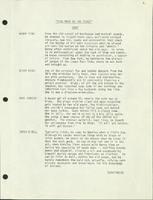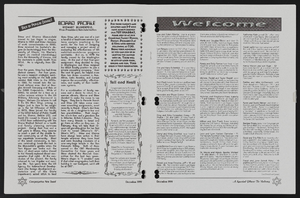Search the Special Collections and Archives Portal
Search Results
Irma McGonagill Photograph Collection
Identifier
Abstract
The Irma McGonagill Photograph Collection (1870-1925) consists of thirty black-and-white photographic prints, ten postcards, and fourteen photographic negatives showing Irma McGonagill and her family in Tonopah, Nevada during the mining boom. The images depict the town of Tonopah, mines around the Tonopah area, homes in Tonopah, and the McGonagill family.
Archival Collection
Lee Plotkin Papers
Identifier
Abstract
The Lee Plotkin papers document Plotkin's political work and associations as an LGBT activist and spokesman for the Las Vegas gay community, and include correspondence, press releases, copies of his columns, institutional and legislative documents, brochures, fliers and other ephemera from 1955 to 2006.
Archival Collection
International Association of Gaming Attorneys Collection
Identifier
Abstract
The International Association of Gaming Attorneys (IAGA) collection is comprised of materials collected from various corporations and casinos in Nevada and New Jersey, ranging from 1977 to 1986. There are a wide array of documents including: gaming license applications from corporations in Nevada and New Jersey, copies of casino control acts from New Jersey, gaming publications, gaming-conference proceedings, gaming commission reports, newsletters and correspondence of the National Association of Gaming Attorneys (NAGA).
Archival Collection
E. P. Carville Scrapbook
Identifier
Abstract
The E.P. Carville Scrapbook (1941) compiled by former Nevada Assemblyman H.E. Hazard documents Carville's governorship of Nevada. It contains articles from a number of Nevada newspapers on topics including the Rio Tinto mine strike, mining, gasoline and liquor taxes, Civil Defense activities, and other issues of importance in 1941.
Archival Collection
John Janney Photograph Collection on Pioche, Nevada
Identifier
Abstract
The John Janney Photograph Collection on Pioche, Nevada contains photographs of mining operations and townspeople in Pioche, Nevada from 1908 to 1934. The photographs are primarily panoramic views of the town, mines, and landscape around Pioche, where Janney was president of Pioche Mines Consolidated until his death in 1967. The photographs also depict the baseball field in Pioche, a train crossing the desert in Lincoln County, and the Lee Family.
Archival Collection
Roger D. Foley Papers on United States v. Cappaert
Identifier
Abstract
The Roger D. Foley Papers on United States v. Cappaert are comprised of materials collected by District Judge Roger D. Foley while performing his duties as judge in
Archival Collection
Las Vegas Archive Memorabilia and Promotional Materials
Identifier
Abstract
The Las Vegas Archive Memorabilia and Promotional Materials (approximately 1960-2019) contains reproductions of photographs taken of historic landmarks around Las Vegas, Nevada and entertainers like Elvis Presley, Nat King Cole, Frank Sinatra, Dean Martin, and Liberace performing in Las Vegas. The collection also contains digital photographs from 2008 of an airship displaying an advertisement for the M Resort Spa and Casino. There is also memorabilia from the MGM Grand Hotel including a gaming guide, decks of playing cards, and a commemorative drinking glass. The collection also includes several historic postcards depicting Las Vegas, political campaign buttons for local Nevada elections, and greeting cards from U.S. Representative Jim Santini.
Archival Collection

David Ober interview, October 11, 2017: transcript
Date
Archival Collection
Description
Tucson, Arizona, native David Ober moved to Las Vegas twice. He arrived reluctantly the first time in 1978 with his parents as a high-school student, when his father, Hal Ober, came to Las Vegas to begin building and marketing the U.S. Home (now Lennar) brand. While the elder Ober soon left U.S. Home to open his own home-building business, R.A. Homes, his youngest child left Las Vegas shortly after his high school graduation to return to his native Tucson, follow in the footsteps of his siblings, and attend the University of Arizona. After graduating from the University of Arizona David Ober opened his own mortgage company and began building a life in Phoenix. In the late 1980s he agreed to take a large pay cut, return to Las Vegas, and learn his father's business from the ground up. At the time, Hal Ober was developing his award-winning, master-planned community, Desert Shores. David Ober, the youngest of the five children of Hal and D'Vorre (Dee) Ober, agreed to participate in the
Text

Script for television pilot, This Must Be the Place by Hank Henry and Bill Willard, 1950s
Date
Archival Collection
Description
The preface and script for a sitcom television show conceived of by Hank Henry and Bill Willard "to evoke the spirit of fun and laughs springing out of conflict and understanding between the old comedy school and the new school."
Text

